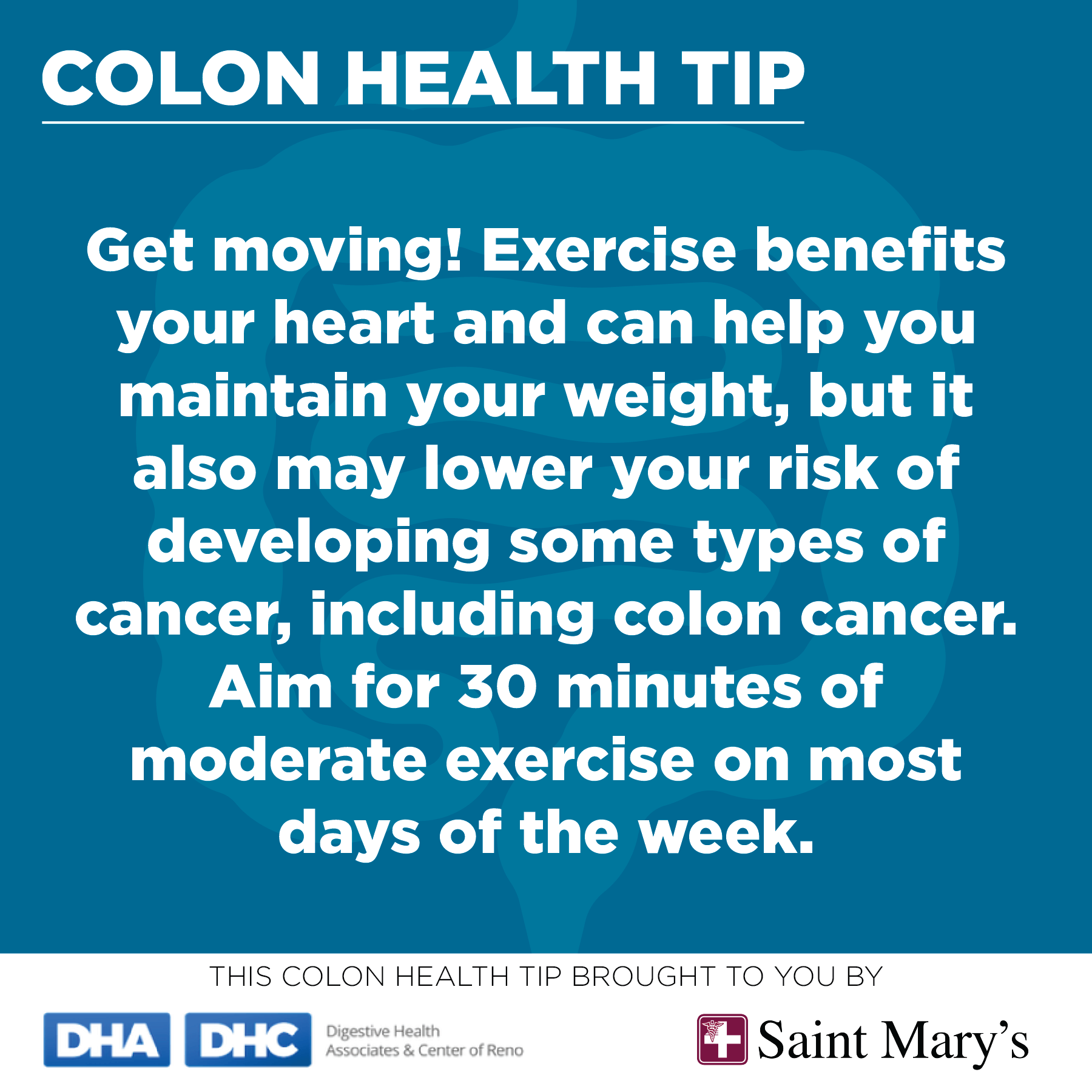Colon Cancer Screening  Back to Procedures
Back to Procedures

Colon cancer forms in the tissues of the colon, which is the largest part of the intestine. Rectal cancer forms in the tissues of the rectum, which is the last several inches of the large intestine before the anus. Either of these cancers is called colorectal cancer. Get a colon cancer screening near you in Reno, Nevada from the GI doctors at Digestive Health Associates now accepting new patients.

Prevent Colon Cancer with Colon Cancer Screenings
Getting screened for colon cancer is one of the the first steps in preventing colon cancer. Regular colonoscopies should begin at age 50 for people with an average risk for developing colon cancer. For those with a family history of polyps or colon cancer, many physicians may recommend starting at age 40. Some recent studies indicate that African-Americans may need to start colon cancer screening at age 45. Consult your physician if you are at high risk of developing colon cancer.
Several colon cancer screening options are available, including a colonoscopy procedure and flexible sigmoidoscopy. More frequent and earlier screening is recommended if you are at high risk for colon cancer. Those with a high risk include:
- Over the age 45
- Polyps, growths inside the colon and rectum that may become cancerous
- A high-fat diet
- Family or personal history of colon cancer
- Ulcerative colitis, Crohn’s disease or other inflammatory bowel diseases
- Sedentary lifestyle
- Diabetes
- Smoking
- Alcohol
- Growth hormone disorder
- Radiation therapy for cancer
In the United States, Colon Cancer Is the Third Deadliest Form of Cancer
Each year about 150,000 people will be diagnosed with colon cancer, and 50,000 people will die from the disease, according to the American Cancer Society. A colon cancer screening could save your life.
- Colon Polyps
- Treatments and Procedures
- Preventing Colon Cancer
- Risk Factors
Colon Cancer Warning Signs and Symptoms
Many cases of colon or colorectal cancer have no symptoms or warning signs until cancer has advanced. That being said, the following symptoms may indicate colon cancer. Of course, other conditions can cause the same symptoms, so patients should consult their doctor if they experience any of the following:
- Abdominal pain or tenderness in the lower abdomen
- Bloody stool, either bright red or very dark
- Diarrhea, constipation or other changes in bowel functions
- Intestinal obstruction
- Narrower than normal stools
- Unexplained anemia
- Unexplained weight loss
- Bloating, fullness or cramps
- Vomiting
- Colon Polyps
Colon Polyps
A colon polyp is a growth of extra tissue in the lining of the bowel, colon, or large intestine. While some can be cancerous, most are not. However, almost all colon cancer does begin as a polyp. Therefore, by removing polyps early the chances of it growing into colon cancer are eliminated. People with a higher risk for developing polyps are anyone over age 50, those who have had polyps previously or those who have a family history of polyps or colon cancer.
Polyps generally do not cause symptoms. If a patient does have symptoms, they can include blood in their underwear or on toilet paper after a bowel movement, blood in the stool, or constipation or diarrhea that has lasted more than a week.
Most important, however, is that not having a family history of colon cancer, or symptoms, does not protect you. In fact, 80 percent of those who are diagnosed with colon cancer have no family history or symptoms.
If polyps are removed through a colonoscopy and performed on the schedule recommended by your physician, the chances of getting colon cancer are dramatically reduced. If precancerous colon polyps are removed, the chance of the polyp turning into cancer is eliminated. If colon cancer is detected early, well before symptoms occur, it is more than 90 percent curable. Depending on an individual’s medical and family history, colonoscopies are typically recommended every one, three, five, or 10 years.
Colon Cancer Treatments
Treatment options for colon cancer depend on the following:
- The stage of the cancer
- Whether cancer has recurred
- The patient’s general health
The three primary treatment options available for colon cancer are surgery, chemotherapy, and radiation. The surgical option, a partial colectomy, is the main treatment and includes removing the affected portion of the colon. How much of the colon is removed and whether it is done in conjunction with other treatments will depend on the location of cancer, how deep it has penetrated the wall of the bowel and if it has spread to the lymph nodes or other parts of the body.
Colon Cancer Procedures
In surgical treatment, the part of the colon that contains cancer, as well as portions of healthy colon on either side, will be removed to ensure no cancer is left behind. Nearby lymph nodes will be removed and tested at the same time. Usually, the doctor is able to reconnect the healthy portions of the colon, but if that is not possible the patient will have a temporary or permanent colostomy bag. A colostomy bag is a device that is worn on the skin discreetly under clothing and is attached to the remaining bowel end. Solid waste material travels into this bag which is then disposed of and replaced as needed. Sometimes, a colostomy is done temporarily to give the bowel time to heal; sometimes it becomes permanent if too much of the colon has to be removed.
If the cancer is small, early-stage and localized in a polyp, it is possible it may all be removed during a colonoscopy.
If the cancer is very advanced or the patient’s health is extremely poor, surgery may be done simply to enhance comfort. This is an operation that will relieve a blockage of the colon to improve symptoms. This will not cure cancer but will relieve pain and bleeding.
Chemotherapy can be used after surgery to destroy any remaining cancer cells and may be recommended by the doctor if cancer has spread beyond the colon. Chemotherapy can be used in conjunction with radiation.
Radiation therapy uses powerful energy sources to kill any cancer cells that may remain after surgery or to shrink large tumors before an operation. This option is rarely used in the early stages of colon cancer.

Lifestyle changes can also be made to reduce the risk of colon cancer. Take the following steps:
- Add fruits, whole grains, and vegetables to your diet
- Limit saturated fat
- Limit alcohol
- Eat a varied diet
- Stop smoking
- Stay active and maintain a healthy body weight
- Add a regular colonoscopy, as prescribed by your physician, to your health-care practices
Here are some tips on what to expect and how you can prepare for your first colonoscopy.
Colon Cancer Screening at Digestive Health Center
At Digestive Health Associates in Reno, NV, our dedicated team of expert gastroenterologists including Dr. Sam Nourani, Dr. Erik De Jonghe, and Dr. William Pfau, specialize colon cancer screenings to ensure your peace of mind and early detection. Regular colon cancer screenings are vital in the prevention and early diagnosis of colon cancer, which is one of the most treatable cancers when detected in its early stages. Your health is our priority, and we are here to provide you with top-quality gastrointestinal care and guidance throughout the colon cancer screening process. Contact us today to schedule your colon cancer screening and take a proactive step towards a healthier future by calling (775) 600-4717.
Request AppointmentComplete Digestive Healthcare From Top-Ranking Gastroenterologists
Schedule an appointment with a Reno GI doctor near you.
Set Appointment







 DHA
DHA